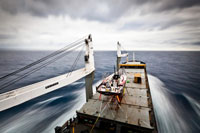
PUMA's Mar Mostro traveling by ship to Cape Town after dismasting. Photo: Amory Ross/PUMA Ocean Racing/Volvo Ocean Race
I was struck by the juxtaposition. Laura Dekker, the Dutch 16 year old who is sailing around the world alone, arrived in Cape Town at roughly the same times as the mega-racers of the Volvo Ocean Race. Well, she arrived at the same time as the three boats that held together long enough to make it Cape Town. The other half of the Volvo Ocean Race fleet traveled by ship to South Africa after rigging or hull failure temporarily put them out of the race.
Ms. Dekker’s voyage thus far has been marked by relative prudence and caution. In August of 2010, she began her voyage by slipping out of Gibraltar unannounced and sailing for the Canary Islands, where she waited out the hurricane season. She has made multiple stops along the way and chose the Panama Canal over rounding Cape Horn. It is very likely that she will be the youngest person ever to sail alone around the world, though her voayage has never seemed to be a race.
That doesn’t mean that she hasn’t seen some challenging sailing. Her blog post from November 27th described sailing around the Cape of Good Hope:
This last leg to Cape Town was really tough. On the last night coming in I reefed the mainsail three times and we rounded the Cape of Good Hope in five metres high breaking waves, Guppy going at 8 knots under the storm jib only. The 35 knots wind that were forecasted soon turned to 40 knots, then to 45 knots and finally to 50 knots with at times 55 knots gusts! This was more than what the storm jib could take, but for some reason it jammed rolling so I couldn’t furl it in… The small sail area left was too much and being knocked down was still a real possibility – it had to come down. In the early morning light as I could barely figure out the huge mass of the Table Mountain nearing, its top rising high above into the clouds, I made my way to the foredeck where under multiple ice cold showers I managed to take the storm jib down.
She arrived in Cape Town and docked by the Volvo racers but soon moved on to a quieter berth:
With her now bare masts Guppy was still heeling heavily as we were heading for the harbor and I was blinded by all the water washing over and the rising sun shining straight into my eyes. Don’t ask me how but I did manage to manoeuvre Guppy through the breakwaters and with its smaller waves I could see that I was now right in with … the Volvo Ocean Race boats! I was allowed to dock and I started to wait for some feeling to come back to my frozen fingers and toes…I saw a few hours later the ‘Camper’ come in – she too is part of the Volvo Ocean Race and is jointly sailed by team Emirates and team New Zealand.. Because it was a little bit to busy over there and a have since moved to the quieter Cape Town marina which is better for Guppy.
Of the six Volvo Open 70s, backed by corporate sponsors and sailed by professional crews, only three – Team Telefónica, CAMPER with Emirates Team NZ, and the Groupama Sailing Team made it to South Africa on their own bottoms. The Abu Dhabi Ocean Racing‘s Azzam lost her mast and Team Sanya suffered hull damage within the first 24 hours of the race. PUMA Ocean Racing’s Mar Mostro lost her rig in the South Atlantic and diverted under jury rig to Tristan de Cuhna. The three damaged boats are traveling by ship, as deck cargo, to Cape Town for repairs and to continue the rest of the eight legs of the race.
When Laura Dekker departs Cape Town, she will be on the final leg of her voyage. We can only wish that transit up the South Atlantic is as drama free as the rest of her voyage. When the Volvo Ocean Race departs Cape Town on December 10th, heading out across the Indian Ocean, we would not be surprised to see the drama continue.

Thanks for this. I enjoyed the juxtaposition and all of its underlying ironies. And I think of fast sailing vs. slow sailing and it’s pretty pointless because it’s the journey itself that matters. I am rooting for Laura and wish her Godspeed!
Interesting comparison, but hardly surprising. I’ve been re-reading “Greyhounds of the Sea” and the clipper ship era saw a huge increase in dismastings, men being washed overboard or just disabled by boarding seas smashing them against deck fittings, gear failures like rudders carrying away, groundings, mutinies, and other drama. On the other hand a voyage to India from Britain in the 1700’s or early 1800’s sounds rather civilized, with sail being routinely reduced at sunset so the crew didn’t have to disturb the passengers by running around the deck or shouting orders in the middle of the night.
Singlehanded cruising (been there, done that, without ever spending a night under way) can be as sane or as crazed as the operator wants. It’s the ultimate in freedom. I wish Laura Dekker fair winds, smooth seas, and a swift passage.